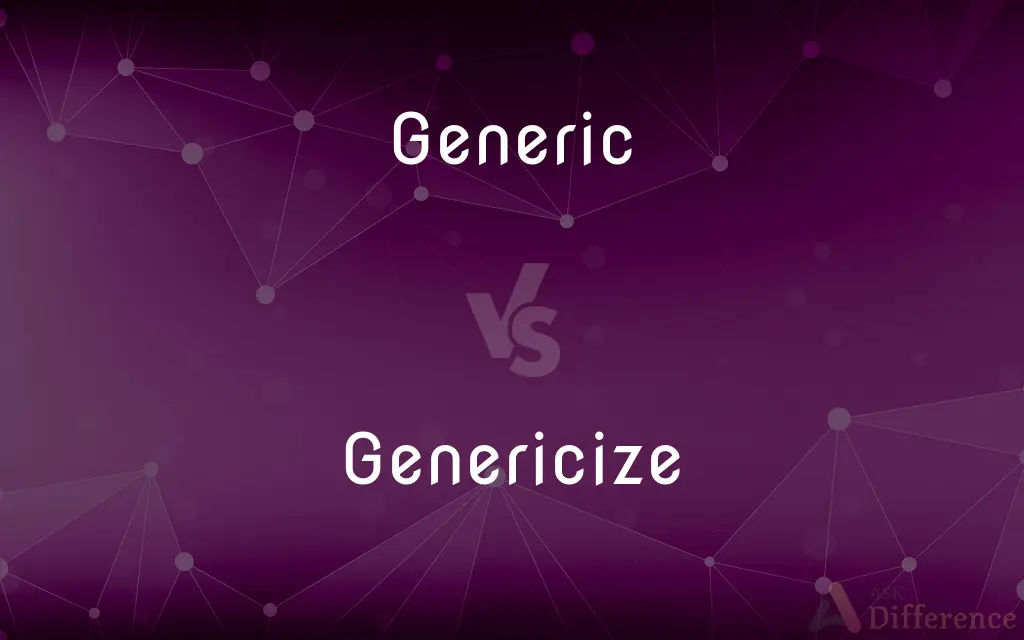Generic vs. Genericize — What's the Difference?
By Maham Liaqat & Fiza Rafique — Updated on April 27, 2024
"Generic" refers to typical, common attributes, whereas "genericize" means to make something non-specific or widespread.

Difference Between Generic and Genericize
Table of Contents
ADVERTISEMENT
Key Differences
"Generic" describes products or terms that are characterized by their lack of a distinctive brand or attributes, typically used to refer to drugs, products, or attributes that are common. "Genericize," on the other hand, is a verb that involves the process of making a specific brand or term broad and common, effectively stripping it of its uniqueness.
Generic products are often seen as more affordable and accessible options compared to branded counterparts, appealing to a wider audience due to their cost-effectiveness. Meanwhile, the process to genericize a product or concept often involves legal and market dynamics that can lead to a shift in how a product or term is perceived by the public.
The term "generic" can be used both as an adjective and a noun, emphasizing a universal or broadly applicable nature without specific distinctions. In contrast, "genericize" functions solely as a verb, indicating the action of rendering something generic.
In pharmaceuticals, a generic drug is bioequivalent to a brand-name drug but does not carry the brand name or trademark. Conversely, the action to genericize drugs involves a patent expiration followed by multiple manufacturers producing the same formulation, making it a generic.
Usage of "generic" in conversation typically relates to describing something common or standard, without any unique features. "Genericize," however, is less commonly used and refers specifically to the process or act of making something generic over time or through deliberate effort.
ADVERTISEMENT
Comparison Chart
Part of Speech
Adjective, Noun
Verb
Definition
Typical or common, lacking distinctiveness
To make something widespread or non-specific
Usage Context
Often used in describing drugs, products
Used in discussing market dynamics, branding
Example of Usage
Generic drugs are cheaper.
Lawsuits can genericize a trademark.
Impact
Indicates an existing state
Indicates a process or change
Compare with Definitions
Generic
Lacking distinctive qualities; very typical.
He lives in a generic suburban neighborhood.
Genericize
To make a branded product or service common through widespread usage.
The term “Google” is often genericized to mean any search on the internet.
Generic
Marketed without a brand name.
Generic products are often found in pharmacies.
Genericize
To remove distinct features from a product or concept.
Long-term use can genericize a company’s distinctive assets.
Generic
Not protected by trademark; applicable to an entire class or group.
Generic medications save costs.
Genericize
To cause a brand to lose its trademark protection through common use.
Band-aid risks being genericized due to its common usage as a term for any adhesive bandage.
Generic
Broadly applicable; general.
She offered some generic advice.
Genericize
To transform a specific or unique item into a common category.
Innovators fear the genericizing of their unique products.
Generic
Characteristic of or relating to a class or group of things; not specific
Chèvre is a generic term for all goat's milk cheese
Genericize
To cause to become generic, especially as a product that is sold without a brand name or as a designation for an entire class of products or services
A trademark that was genericized and used to refer to any kind of cola.
Generic
Relating to a genus.
Genericize
(transitive) To make generic.
Generic
A consumer product having no brand name or registered trademark
Substituting generics for brand-name drugs
Genericize
To turn into a genericized trademark.
Generic
Relating to or descriptive of an entire group or class
Cancer is a generic term for a group of diseases in which cells proliferate wildly.
Genericize
(pharmacy) To make generics out of.
Generic
Lacking specificity; general
Made some generic remarks about how to save for retirement.
Genericize
To make more generic: usable in more contexts.
Generic
(Biology) Of or relating to a genus.
Genericize
(transitive) To make generic: bland.
Generic
Relating to or being a product that is sold or distributed without any brand name or without a widely known brand name, especially as a discount alternative to a name-brand product
Generic soap.
Genericize
To apply a general label to an item or concept.
Genericizing complex topics often leads to misunderstandings.
Generic
Relating to or being the official nonproprietary name of a drug, under which it is licensed and identified by the manufacturer.
Generic
(Grammar) Specifying neither masculine nor feminine gender
Generic nouns like waitperson and executive.
Generic
A product or substance sold under or identified by a generic name.
Generic
A wine that is a blend of several grape varieties and does not carry the name of any specific grape.
Generic
Very comprehensive; pertaining or appropriate to large classes or groups (genera) as opposed to specific instances.
Generic
(taxonomy) Pertaining to genera of life instead of particular species thereof.
Generic
Lacking in precision, often in an evasive fashion; vague; imprecise
Generic
(of a product or drug) not having a brand name; nonproprietary in design or contents; fungible with the rest of its class.
Generic
Relating to gender.
Generic
(grammar) specifying neither masculine nor feminine; epicene; unisex.
Words like salesperson and firefighter are generic.
Generic
Written so as to operate on any data type, the type required being passed as a parameter.
Generic
Having coordinates that are algebraically independent over the base field.
Generic
A product sold under a generic name.
Generic
A wine that is a blend of several wines, or made from a blend of several grape varieties.
Generic
(grammar) A term that specifies neither male nor female.
Generic
Pertaining to a genus or kind; relating to a genus, as distinct from a species, or from another genus; as, a generic description; a generic difference; a generic name.
Generic
Very comprehensive; pertaining or appropriate to large classes or their characteristics; - opposed to specific.
Generic
Not protected by trademark; - used especially of the names of medications; as, a generic drug; the generic name of Rogaine is minoxidil.
Generic
Relating to or common to or descriptive of all members of a genus;
The generic name
Generic
(of drugs) not protected by trademark;
`Acetaminophen' is the generic form of the proprietary drug `Tylenol'
Generic
Applicable to an entire class or group;
Is there a generic Asian mind?
Generic
Relating to or descriptive of an entire group or class.
This is a generic study of medieval architecture.
Common Curiosities
What does "generic" mean in the context of products?
Generic refers to products typically marketed without a brand name, especially drugs that are bioequivalent to brand-name products but cheaper.
What does it mean to genericize a term?
To genericize a term means to make it so widely used for similar things that it loses its original association with a specific brand.
How does genericizing affect the market?
Genericizing can lead to increased competition and lower prices as more generic versions of a product or service become available.
What are the legal implications of a term becoming genericized?
If a term becomes genericized, it may lose trademark protection, meaning that any company can use the term to describe their product, which dilutes the original brand's value.
Why do companies fear their products becoming genericized?
Companies fear genericization because it can lead to a loss of trademark protection and brand identity, potentially reducing their market share and profitability.
Can any product become generic?
Yes, any product can become generic if it loses its brand distinctiveness and becomes commonly used to refer to a type of product rather than a specific brand.
How does genericization impact consumer perception?
Genericization can lead to a change in consumer perception, where the uniqueness and premium appeal of a brand are diminished, possibly affecting customer loyalty.
What role do patents play in the process of genericization?
Patents protect the uniqueness of a brand; once they expire, other companies can produce and sell generic versions, which may contribute to the genericization of the original product.
What are common examples of generic products?
Common examples of generic products include over-the-counter medications like ibuprofen and store-brand grocery items.
What is required for a product to be considered generic?
A product is considered generic when it is marketed without a brand name and is intended to be interchangeable with a branded product, usually following patent expiration.
Can a service be genericized?
Yes, a service can also be genericized if it becomes so commonly provided under various brands that its original provider’s brand identity becomes less distinctive.
Share Your Discovery

Previous Comparison
College vs. Colleague
Next Comparison
Lay vs. LieAuthor Spotlight
Written by
Maham LiaqatCo-written by
Fiza RafiqueFiza Rafique is a skilled content writer at AskDifference.com, where she meticulously refines and enhances written pieces. Drawing from her vast editorial expertise, Fiza ensures clarity, accuracy, and precision in every article. Passionate about language, she continually seeks to elevate the quality of content for readers worldwide.
















































